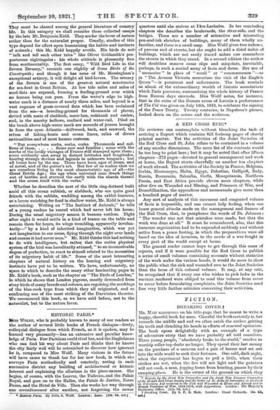HISTORIC PARIS.*
kiss WOLFF, who is probably known to many of our readers as the author of several little books of French dialogue—lively, colloquial dialogue from which French, as it is spoken, may be learned very pleasantly—has an extensive and peculiar know- ledge of Paris. Few Parisians could rival her, and the Englishman who can find his way about Paris and thinks that he knows the city fairly well will be astonished to discover how ignorant he is, compared to Miss Wolff. Many visitors in the future will have cause to thank her for her new book, in which she surveys Paris methodically and concisely, noting in each successive district any building of architectural or historic interest and explaining the allusions in the place-names. She begins, of course, with the Louvre, the Tuileries, and the Palais Royal, and goes on to the Haller, the Palais do Justice, Notre Dame, and the Hotel de Ville. Then she works her way through one arrondissement after another, not forgetting the newer • Historic Paris. By Jetta S. Wolff. London: Lane. Lies. 6d. net.J quarters until she arrives at Pere-Laohaise. In her concluding chapters she describes the boulevards, the river-side, and the bridges. There are a number of attractive and interesting pen-and-ink sketches of buildings, many of them wholly un- familiar, and there is a small map. Miss Wolff gives two indexes, of Person and of streets, but sho ought to add a third index of buildings, which are not easily traced unless one remembers the streets in which they stand. In a second edition the author will doubtless remove eome slips and misprints, inevitable, perhaps, in such a serried array of facts and dates. Her use of " memorize " in place of " recall " or " commemorate "—as in " The Avenue Victoria memorizes the visit of the English Queen "—is persistent and unfortunate. The book reminds us afresh of the extraordinary wealth of historic associations which Paris possesses, summarizing the whole history of Franca from Roman days onwards. Miss Wolff notes, for instance, that in the ruins of the Roman arena of Lutetia a performance of The Cid was given on July 14th, 1919, to oelebrate the signing of the Peace Treaty. Twenty centuries, in Napoleon's phrase, looked down on the actors and the audience.


































 Previous page
Previous page